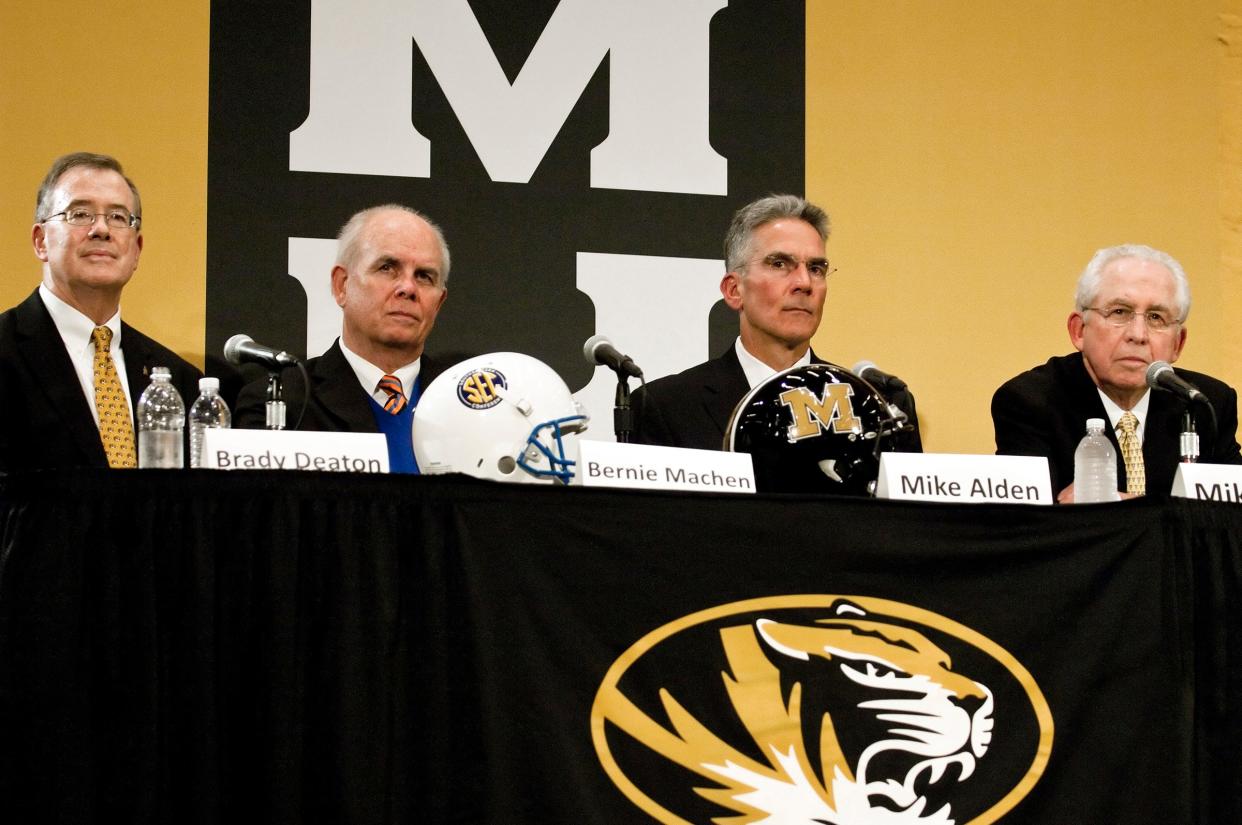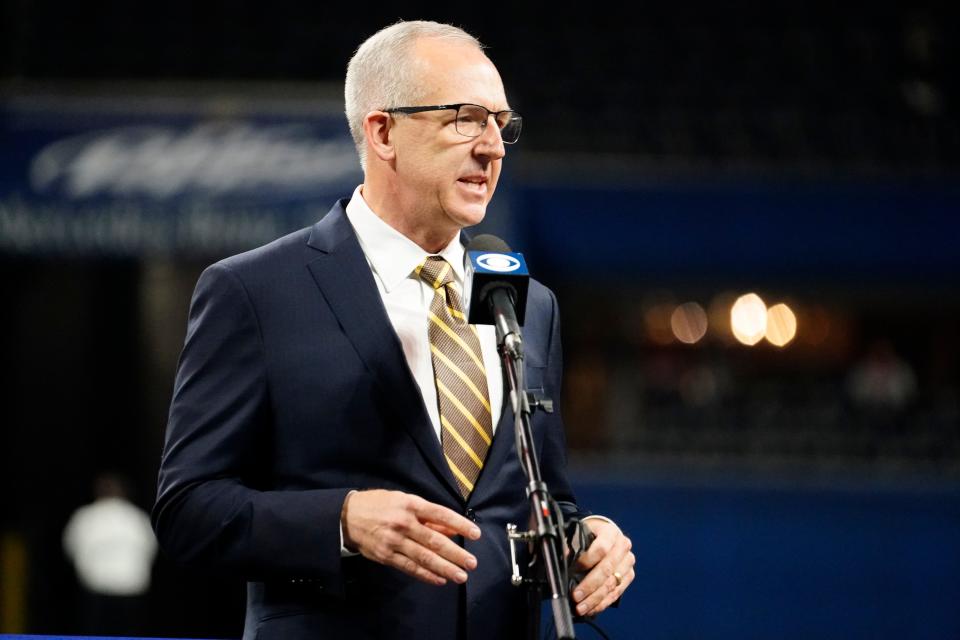Kwiecinski: Past Mizzou leaders deserve Tigers fans' thanks in wake of conference shakeups

Former Missouri Gov. Jay Nixon might have been on to something in 2010.
The University of Missouri alum and leader of the Show-Me State was bullish on the idea of MU leaving the Big 12 for this other established conference, one that had made consistent appearances in national championship games.
That’s right, the Big Ten.
“I’ve said all along if the Big Ten is interested in us, we should listen to what they have to say,” Nixon told the Tribune in June 2010. “We’re a valuable commodity.”
Maybe Nixon was on to something, seeing as USC and UCLA have officially announced their move to the Big Ten last week in a move that shocked the college sports world.
"Maybe he was," former MU athletic director Mike Alden said, with a laugh. "He was a huge advocate of our state and he was a huge, huge advocate for us at Mizzou."
That move didn’t work out. The Big Ten opted to add Nebraska as the Big 12 watched Colorado leave for the Pac-12. Missouri, eying stability, then landed in the SEC, which had just poached Texas A&M from the Big 12.
After a decade of retrospection, Missouri saved itself.
The school has its former leaders to thank for that.

When MU aligned itself with the SEC those 10 years ago, the program saved itself from a fight with other institutions that could desperately vie for a spot within the Big Ten or the SEC in the coming years.
Both Alden and former MU Chancellor Brady Deaton told me that the idea of super conferences existed a decade ago. Rumors grew and speculation in the media existed, but it never materialized until 2022.
Still, to see it come to fruition just 10 years later was still a surprise for Alden, especially seeing how USC and UCLA jumped to a conference with few regional and historical ties.
The bottom line is college football is changing. That’s just the way it is today. Being a decade ahead of those drastic changes to the sport saved Missouri’s position as a major player in the Midwest/Southern region of college sports.
More: Mizzou gave married seventh-year QB Jack Abraham 'full clarity' where to spend final season
"It validates what we did," Alden told the Tribune. "It validates Missouri's move, Texas A&M's move. I think it validates, at this point, that people saw that taking place, and with that was something that eventually, at this point in time, shows probably the direction that folks ultimately ended up going right now."
It’s ironic to think about how Missouri’s move to the SEC transpired in 2012.
MU sought stability after Texas flirted with the Pac-10 in 2010, which is such a weird sentence to type in 2022 as the Longhorns are about two years from joining the SEC.
USC and UCLA wanted the same and reportedly initiated contact with the Big Ten.
“After receiving written applications from the two universities, Big Ten Conference Commissioner Kevin Warren, alongside conference athletics directors and the Council of Presidents and Chancellors, evaluated the applications based on a dynamic model weighting four primary principles with supporting criteria,” the Big Ten wrote in a statement announcing the unanimous additions of USC and UCLA.
“The principles include academics and culture; student-athlete welfare, competition, and logistics; commitment to diversity, equity, and inclusion in sports; and financial sustainability. The model allows the conference to analyze criteria in a strategic and effective manner.”
More: Mizzou fans show anticipation for Luther Burden who promises 'hard work' in his first season
The move to the SEC not only put Missouri on the map immediately with two consecutive trips to the SEC football championship game in 2013 and 2014, but it never allowed the program to completely bottom out even after the Barry Odom era and, in men’s basketball, the Kim Anderson era.
Missouri earned $38,280,619 through media deals and $29,868,483 through SEC revenue distributions in 2021. In 2022, that SEC revenue distribution number will jump to $55 million for Missouri, according to the SEC in February. According to reports, the Big 12’s distribution number will be around $42.6 million.
That’s the benefit of an SEC program. The tough task at hand is finding a way to stay competitive. Especially as the game changes and could continue to change.

Consider this: The SEC made the first move in the summer of 2021. Texas and Oklahoma both announced they would leave for the SEC, leaving the Big 12 behind for greener bags, er, pastures.
The Big Ten would follow suit a year later, adding USC and UCLA in a move that transcended established college football norms and damned geographic rivalries.
What, then, is next?
Is Notre Dame heading to the Big Ten? Rumors are the conference is waiting on the Irish’s decision before potentially continuing its flirt with Washington and Oregon. Perhaps another curveball awaits.
Should the Big Ten make those moves, what’s next for the SEC? The Pac-12 and Big 12 have since been pillaged. Is the ACC next, with the potential mega-prizes being Miami, Florida State and Clemson?
Following the trend of the Big 12 last year, to the Pac-12 this year, perhaps those questions about the ACC get answered next year.
What then in the meantime?
Perhaps the SEC should hire Nixon as a special advisor? Maybe the Big Ten should? What are current Missouri Gov. Mike Parson’s thoughts on conference realignment, considering the clairvoyance Missouri governors apparently have?
That, thankfully for MU, really doesn’t matter. Eli Drinkwitz can carry on with his goal of winning the SEC East, Dennis Gates can focus on building a winning roster in the SEC and MU’s other programs can compete for SEC championships.
In other words, business as usual.
Unless one of the next curveballs thrown is the Power 2 of the SEC and Big Ten removing members it deems unworthy, which does not seem to be the case at all, Missouri has no need to fret.
A place at the SEC table set in 2012 maintains tremendous value in 2022.
The Tigers are fine, thanks to the leadership from over 10 years ago making a decision that puts the Missouri in a place where it doesn’t have to fight for a spot.
A thank you — or a few — are in order for those who made the move in the first place.
Chris Kwiecinski is the sports editor for the Columbia Daily Tribune, overseeing University of Missouri and Boone County sports coverage. Follow him on Twitter @OchoK_ and contact him at CKwiecinsk@gannett.com or 573-815-1857.
This article originally appeared on Columbia Daily Tribune: Why past Mizzou leaders deserve thanks after USC, UCLA's Big Ten move

